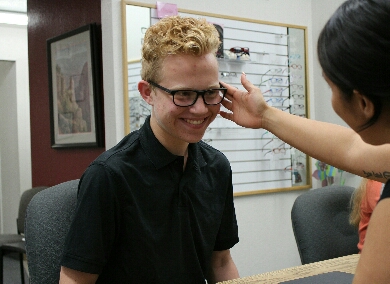
Most people know that glasses can help them see more clearly. Many times glasses are designed to do just that, but using the most appropriate lenses can do more: Lenses can help people think more clearly.
Lenses affect not only how clear things look, but also how well your brain and your eyes work together, and how comfortably you see, work, and learn.
The best lenses for you
Your optometrist uses special tests to learn about how you use your eyes and vision in order to prescribe the best lenses for your specific needs.There is usually a range of prescriptions that are possible. Once your doctor knows how you react to changes in lenses, your prescription can be designed to match how you use your vision to guide what you do.
Different job - different lenses
Glasses that are most appropriate for one distance or one activity may not be suitable for another. A common example is when we get a bit older and need glasses to read, the best glasses for seeing up close are blurry for looking far away. Another example is glasses for seeing clearly far away is often too strong for using on the computer especially for long periods of time. Prolong usage of too strong of a prescription at near can make us uncomfortable and can cause our prescription to change undesirably.
Depending on your way of doing things, different glasses can be prescribed for different needs. If you are on the computer all day, a pair of progressive lenses does not work as well as a single vision computer glasses. Once your doctor knows how you react to changes in lenses, your prescription can be designed to match your lifestyle.
One important place to consider a bifocal lens is in the classroom. When the best lens for seeing up close is not the same as the best lens for seeing far away, careful design of a bifocal lens is often the answer. This will allow the child to see clearly in the distance without overworking at near.
Learning lenses
Lenses and learning are an area of vision care that has long been misunderstood. Many doctors still believe that if a child can see well far away they will automatically be able to perform well at all distances. Having 20/20 vision in the distance has very little correlation to a child's ability to read and learn.
It is now well known to science that we use our two eyes and brain as one to direct action. The appropriate lenses can improve learning performance and efficiency at the work we do up close.
Learning or performance lenses help point and focus the eyes more accurately for the work that needs to be done. This can improve reading comprehension, attention, and handwriting skills.
In some cases there will be an improvement in performance that you and your optometrist can see right away. In other cases, the improvement takes a little longer as reduced stress and improved attention remove roadblocks so learning can take place easier over time.
Your glasses - just for you
- Lenses can be designed individually to protect us, help us see more clearly, help us pay attention, help us work longer, and help us work smarter.
Not all optometrists practice behavioral optometry, which includes developmental and functional optometry. Make sure you receive a yes answer to each of the following questions before you make an eye appointment:
- Do you perform a full series of near point vision tests.
- Do you perform work-related visual perception tests?
- Do you provide full vision care and visual training in your office, or will you refer me to a colleague if needed?
- Will you see me again during the year, and periodically to determine my progress?
If you do not have an optometrist who practices behavioral optometry, log on to the Optometric Extension Program Foundation website at www.oepf.org. Go to "find an Optometrist" on the pull-down menu and input your city/state/zip code into the form to start you search. Or , call or write to Family Optometry 480-963-8833.